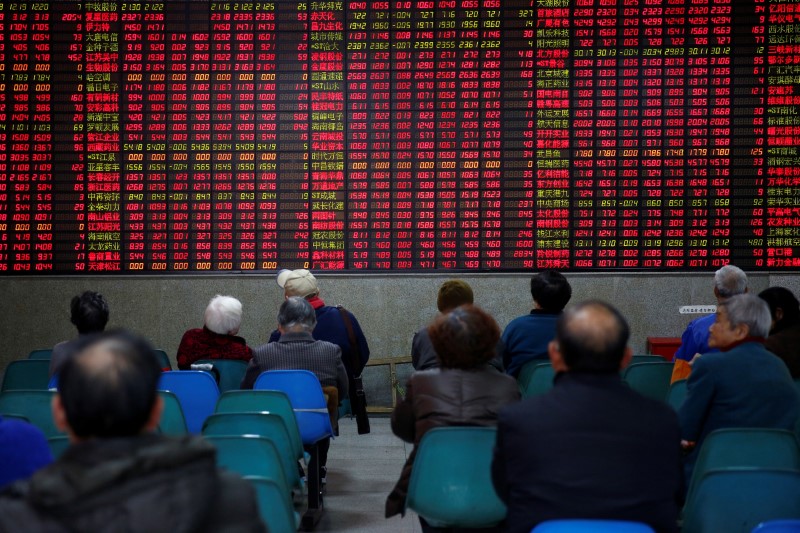Investing.com’s stocks of the week
SHANGHAI (Reuters) - China's stock investors are chasing up the country's version of the "Nifty 50" index as their love affair with trendy small caps fades amid a regulatory crackdown on speculation and concerns that the economy may lose momentum later in the year.
The shift in investor preference has also been fueled by a desire for more stable returns, and a burst in supply of listed start-ups favored by smaller punters seeking quick gains.
The term "Nifty 50" originally referred to a group of 50 U.S. stocks favored by institutional investors in the 1960s and 1970s, including stalwarts like General Electric (NYSE:GE), Coca-Cola, and IBM (NYSE:IBM), once known as "one-decision" stocks investors could buy and hold forever.
Now Chinese investors are piling into their approximate counterparts such as home appliance maker Gree Electric <000651.SZ> and spirit maker Kweichow Moutai (SS:600519).
Despite recent market weakness, Gree has gained some 38 percent this year and hit record highs this week, while Kweichow Moutai became the world's biggest liquor maker by market capitalization, dethroning British distiller Diageo Plc (L:DGE).
Big cap stocks have always had a stable and loyal following among institutional investors in China, but have lacked the magnetism of small caps in a country where the retail investing culture is imbued with a high appetite for risk.
"The upward trend for blue-chips like Moutai is not yet over," Eastmoney Securities strategist Zhang Jiadai said, citing Moutai's generous dividend payouts and "modest" valuation, at roughly 24 times forward earnings.
The brokerage's blue-chip Eastmoney Nifty 50 Index has gained over 5 percent so far this year, outperforming the market benchmark Shanghai Composite (SSEC), which is up roughly 2 percent.
Meanwhile, investors are dumping small caps, with the growth board ChiNext <.CHINEXTP> down nearly 6 percent.
Zhang predicted that bearish trend "will last for a long time," potentially halving the index's valuations from the current level.
DRAMATIC REVERSAL
Such divergence underscores a dramatic reversal from Chinese investors' strong preference for small-caps over blue-chips since 2009, creating huge valuation gaps.
Even after this year's sharp correction, ChiNext still trades at an earnings multiple of roughly 50, while the SME board is around 40.
In contrast, the SSE50 Index (SSE50), another gauge that some liken to China's "Nifty 50", trades at price/earnings ratio under 10.
Interest in small caps is quickly waning as regulators have restricted reckless fundraising, blocked "blind" acquisitions and vowed to "brandish the sword" against speculation.
"There had been a lot of speculative interest in small-caps, because high valuations allowed them to raise money cheaply to fund acquisitions and thus maintain rapid growth," said Zhou Liang, fund manager at Minority Asset Management Co.
"Once they can no longer keep playing this game, they reveal their true features," Zhou said, adding he would not be surprised to see the average valuation of ChiNext shares halve over the next two to three years.
In addition, regulators are loosening the tap on initial public offerings (IPOs), flooding the market with newly-listed start-ups and this depressing valuation of small caps in general.
Fund manager Zhou predicted that blue chips will continue to rally due to their relatively low valuations and stable returns, saying it is "a new cycle that has just started".
Hou Bin, a fund manager at Goldstate Capital Fund Management Co, said he favored modestly-priced banking and home appliance stocks, because "when liquidity conditions tend to tighten, and risk appetite is low, stocks with high valuations will be dumped".
But Wu Kan, head of equity trading at Shanshan Finance, said there may be a silver lining in that painful process for discerning investors.
"As the bubble deflates, there will definitely be bargain opportunities for those real growth stocks with core competitiveness."
